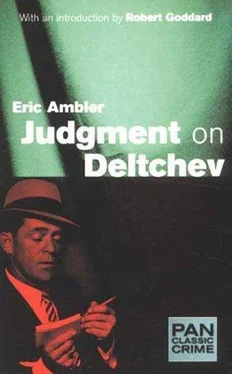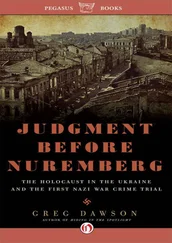Eric Ambler - Judgment on Deltchev
Здесь есть возможность читать онлайн «Eric Ambler - Judgment on Deltchev» весь текст электронной книги совершенно бесплатно (целиком полную версию без сокращений). В некоторых случаях можно слушать аудио, скачать через торрент в формате fb2 и присутствует краткое содержание. Год выпуска: 1977, ISBN: 1977, Издательство: Vintage, Жанр: Криминальный детектив, на английском языке. Описание произведения, (предисловие) а так же отзывы посетителей доступны на портале библиотеки ЛибКат.
- Название:Judgment on Deltchev
- Автор:
- Издательство:Vintage
- Жанр:
- Год:1977
- ISBN:9780307049971
- Рейтинг книги:4 / 5. Голосов: 1
-
Избранное:Добавить в избранное
- Отзывы:
-
Ваша оценка:
- 80
- 1
- 2
- 3
- 4
- 5
Judgment on Deltchev: краткое содержание, описание и аннотация
Предлагаем к чтению аннотацию, описание, краткое содержание или предисловие (зависит от того, что написал сам автор книги «Judgment on Deltchev»). Если вы не нашли необходимую информацию о книге — напишите в комментариях, мы постараемся отыскать её.
Judgment on Deltchev — читать онлайн бесплатно полную книгу (весь текст) целиком
Ниже представлен текст книги, разбитый по страницам. Система сохранения места последней прочитанной страницы, позволяет с удобством читать онлайн бесплатно книгу «Judgment on Deltchev», без необходимости каждый раз заново искать на чём Вы остановились. Поставьте закладку, и сможете в любой момент перейти на страницу, на которой закончили чтение.
Интервал:
Закладка:
‘It is my brother,’ said Valmo quickly.
Then the door opened and a young man came into the room. He saw me and stopped.
‘Good evening, Jika,’ Valmo said. ‘We are talking a little business. I shall be with you in a minute.’
He was about twenty-five, dark and very tired-looking. He had a raincoat on and his hair was blown about as if he had been in an open car. He looked at us suspiciously. For a moment he did not move; then he turned away slowly and went to the door.
‘Don’t be too long, Aleko,’ he said. ‘I have something for you.’
I raised the brandy to my mouth again. I was not looking directly at Pashik, but I could see his face and it had gone the colour of mud. He knew that I had seen the ‘Aleko’ note in the Deltchev file and for some reason was terrified lest I had remembered it. Aleko himself was waiting for me to finish my drink. The use of his Christian name had not visibly upset him. But the situation was delicate. I had seen something I should not have seen, but Pashik did not know if I realized it. The main thing then was to get out of the apartment before he could make up his mind what to do. I drank the brandy at a gulp and held out my hand to Aleko.
‘Thank you, Herr Valmo, and goodbye.’
He smiled agreeably. ‘I hope your stay is pleasant here, Herr Foster,’ he said.
I turned to Pashik. ‘Are you going to drive me back to my hotel, Pashik?’
‘Yes, Mr Foster, yes,’ he said heavily.
We went along the passage to the front door. Aleko came out to the lift with us. He shook my hand again.
‘I have liked you, Herr Foster,’ he said, ‘and with a journalist that is a new experience for me. I have faith in you. Goodbye.’
He might have been sending a promising young dancer on a first international tour.
Pashik was already in the lift. I got in after him. We went down in silence.
It was not until we were in his car and out on the road again that I broke the silence.
‘Aleko Valmo,’ I said. ‘A curious name.’
‘In these parts it is quite common, Mr Foster,’ he said calmly.
He had made up his mind that I had forgotten the other name.
I was not feeling very friendly toward Pashik, and for a moment or two I toyed with the idea of asking him suddenly, ‘What was the case of K. Fischer, Vienna ’46, about, Pashik, and what had Aleko to do with it?’
Then I decided not to. We did not speak again until he drew up outside my hotel. As I went to get out, he put his hand on my arm, and his brown eyes sought mine.
‘Mr Foster,’ he said, ‘it has been a lousy experience for you this evening and no doubt you will wish to forget all about it. That is, if you are wise.’
I did not answer. His voice took on its cautious roundabout tone.
‘I wish only to tell you,’ he said, ‘that I understand your feelings and share them. But you have your own profession and need not trouble about what happens to dead-beats and bums far away from your home. Men are dying all over the world for the causes they believe in. You cannot fight their battles.’
‘Are you telling me that I should mind my own business?’ I asked.
‘Ah, please, Mr Foster!’ He spread his hands out. ‘You are mad at me.’
I was exasperated. ‘I’m not mad at you, Pashik. I’m merely trying to get you to say straight out what you mean without all this double talk. I don’t mind being advised to mind my own business. That’s all right. I don’t have to take the advice if I don’t want to. I’m still capable of deciding what is my own business and what isn’t. I’m not fighting any battles. I’m trying to find out what goes on here.’
‘That is what I mean, Mr Foster. It does no good to try.’
‘You mean I won’t be able to find out?’
He looked away from me and picked at the steering wheel. ‘You force me to be frank, Mr Foster.’
‘What’s the matter with frankness? Why has it to be forced?’
‘You say you fight no battles, Mr Foster,’ he said quietly, ‘but I tell you, you are wandering like a fool between the opposing forces of those who are. That is a crazy thing to do. Once, years ago in Vienna, I saw street fighting between troops and revolutionaries. The fighting went on for many days. But there was one street that was swept equally by the fire of both sides, and neither could advance. Then one afternoon something very silly happened, as so often it happens in war. Into this empty, silent street there came a man. We heard his footsteps first. Then we saw him. He staggered from a side turning right into the middle of the street and stood there swaying. He belonged to neither side. He was drunk and did not know where he was or what he was doing. He began to sing and wave and call out for a woman. At first the soldiers laughed and shouted jokes at him. But after a while their officer noticed that the enemy was taking advantage of the distraction to run across the far end of the street in ones and twos so as to outflank the troops. He shouted a warning and they opened fire. The enemy replied with covering fire and the street was swept from end to end with machine-gun bullets. The drunk was killed immediately. You see, Mr Foster?’
‘Which side were you on?’
‘I was a soldier then. I have been many things, Mr Foster.’
‘Yes. Tell me. The reason that your friend Valmo doesn’t want me to go to the Deltchev house again is that he doesn’t want me to ask Katerina Deltchev to confirm his story, isn’t it?’
‘I don’t know, Mr Foster. As long as you keep faith with Mr Valmo it does not matter. One thing I have to ask of you myself, however. I thought it discreet not to mention your connection with Petlarov; it would have complicated the affair. None of these things must on any account be mentioned to Petlarov. Or Mr Sibley. That is most important.’
‘All right.’ I was tired of the whole business now. I wanted to get to bed. I opened the car door. Pashik put out his hand again.
‘You will think over what I said, Mr Foster,’ he said anxiously. ‘It is for your own good I ask.’
I got out of the car. ‘I’ll be very sober,’ I said. ‘That I promise you. Good night.’
I was about to slam the door. He leaned across and held it open. His glasses flickered in the light from the hotel entrance as he looked up at me.
‘I hope so,’ he said slowly. ‘But if you do not intend to take my advice, Mr Foster, it might be less painful to be drunk. Good night.’
Then he shut the door and drove off.
I did not sleep well that night.
CHAPTER TWELVE
It was on the fourth day of the trial that the evidence connecting Deltchev with the Brotherhood was given.
When the court opened, a man named Kroum was called into the witness box. He was about fifty, with a bald head and glasses and an erect military appearance. He looked shrewd and brutal. He described himself as a Brigadier of Police in the detective department of the Ministry of the Interior. He was carefully washed and brushed and his manner was irritatingly complacent.
Prochaska began his examination in what was for him an unexpected way.
‘Brigadier Kroum, how long have you been a member of the police?’
‘Thirty years, sir.’
‘How long have you held your present appointment?’
‘Twelve years, sir.’
‘Are you a member of any political party?’
‘No, sir.’
‘Have you any political affiliations?’
‘No, sir.’
‘None at all?’
‘I do not interest myself in politics, sir. I have my work to do.’
‘An excellent citizen! Have you ever arrested a man or ordered his arrest for political reasons?’
‘The only reason for any arrest, sir, is that a man breaks or is suspected of breaking the law. I do not make the law. It is my duty simply to enforce the law under the constitution. That is the duty of every police officer,’ he added.
Читать дальшеИнтервал:
Закладка:
Похожие книги на «Judgment on Deltchev»
Представляем Вашему вниманию похожие книги на «Judgment on Deltchev» списком для выбора. Мы отобрали схожую по названию и смыслу литературу в надежде предоставить читателям больше вариантов отыскать новые, интересные, ещё непрочитанные произведения.
Обсуждение, отзывы о книге «Judgment on Deltchev» и просто собственные мнения читателей. Оставьте ваши комментарии, напишите, что Вы думаете о произведении, его смысле или главных героях. Укажите что конкретно понравилось, а что нет, и почему Вы так считаете.












